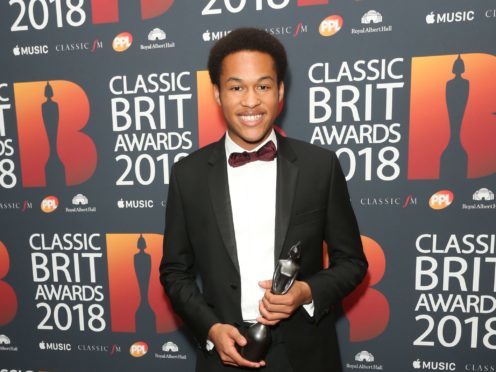Royal wedding cellist Sheku Kanneh-Mason was one of the big winners at this year’s Classic Brit Awards, taking home two of the top prizes for the night.
The musician, who performed at the wedding of the Duke and Duchess of Sussex in May and who is still a student at the Royal Academy of Music, was crowned the winner of both the male artist of the year award and the critics’ choice prize at the event at London’s Royal Albert Hall on Wednesday.
Accepting the critics’ choice award, he said: “I feel very lucky to have had some amazing musical education from a young age.
“I think the skills I have learned, especially listening, would improve the world we live in today.”
The 19-year-old’s double triumph came as the Classic Brits, which celebrates music from the worlds of classical, film, television, theatre and games, was held for the first time in five years.
Hosted by Classic FM presenters Myleene Klass and Alexander Armstrong, the awards ceremony also saw the likes of Michael Ball and Alfie Boe, and Tokio Myers take home some of the coveted gongs.

Duo Ball and Boe won two prizes, including the popular vote for Classic FM album of the year, and the group of the year accolade.
Ball expressed his gratitude to Boe in helping him fulfil his dream of winning a Classic Brit not once, but twice.
He said: “There is only one way I can thank this man publicly” before turning to Boe and kissing him on the lips.
Last year’s Britain’s Got Talent champion Myers, who has impressed audiences with his piano-led mash-ups of classics and pop tracks, won the PPL Classic Brits breakthrough artist of the year gong.
Congratulations to @mrmichaelball and @AlfieBoe as their album 'Together Again' has been crowned @ClassicFM's Album of the Year through public vote!#ClassicBRITs pic.twitter.com/902UpbhJfI
— Classic BRIT Awards (@classicbrits) June 13, 2018
Dame Vera Lynn received the lifetime achievement award from the British music industry to mark her 101st year.
The prize was picked up by her daughter Virginia.
She read a message Dame Vera had written for her to read out as an acceptance speech.
The message said: “I was very surprised and very happy to receive this award after so many years in showbusiness, which I have enjoyed very much and has given me the opportunity to meet and work with some great fellow artists, something I would never been able to do if I hadn’t been in my profession.
“I never imagined when a small child growing up in East Ham that I would be able to travel around the world as I have done, and seen and experienced so many interesting places and to meet so many interesting people.”
Lord Andrew Lloyd-Webber was awarded the special recognition award for musical theatre and education, and Italian singer Andrea Bocelli was crowned the winner of the Classic Brits icon prize.
The #ClassicBRITs are proud to both celebrate one of Britain’s finest modern talents and support his incredible work to keep music at the heart of British education by awarding @OfficialALW a Special Recognition Award for Musical Theatre & Education! 🎭 pic.twitter.com/PxwaEWpAjr
— Classic BRIT Awards (@classicbrits) June 13, 2018
The ceremony also saw the return of mezzo-soprano Katherine Jenkins, who made her stage comeback after welcoming her second child in late April.
She performed Never Enough from The Greatest Showman – the Hugh Jackman film whose soundtrack became the UK’s biggest selling album of 2018.
The Greatest Showman Soundtrack bagged a prize on the night too as it was picked up the soundtrack of the year award.

Other winners included American lyric soprano Renee Fleming, who won female artist of the year, and saxophone player Jess Gillam won the inaugural Sound of Classical Poll.
Geoff Taylor, chief executive at the BPI and the Brit Awards, said: “We congratulate all The Classic Brits winners on their deserved awards, which reflect classic music in all its diversity.
“It’s wonderful to see great icons such as Dame Vera Lynn and Andrea Bocelli being rightly honoured, but also very encouraging to witness a new wave bristling with talent such as Sheku Kanneh-Mason, Tokio Myers and Sound of Classical Poll winner Jess Gillam breaking through.
“With such exciting new artists, classic music is evolving and embracing the opportunities that the streaming era offers to connect with new fans.”
The ceremony concluded with musical theatre composer Andrew Lloyd Webber accepting a special recognition award.
Lord Lloyd Webber’s prize was given to him by singer Dame Shirley Bassey, whose music the Cats and Evita composer praised as he began his acceptance speech.
Lord Lloyd Webber, who received a lifetime award at the Tony Awards on Sunday, criticised Government cuts to musical education in schools as “absolutely ludicrous”.
He described music as “the empowering force for children” and suggested that keeping music tuition in schools helped to stop young people joining gangs.
He concluded his speech by reflecting that if the Royal College of Music hadn’t been free to attend when he was a student then he “might not be standing here now”.
